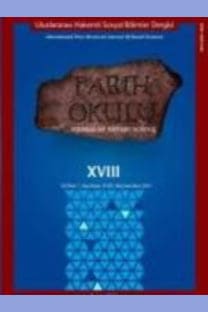J. J. ROUSSEAU’NUN UYGARLIK ELEŞTİRİSİ
Rousseau’nun betimlediği doğa durumunda insan, özgür ve uyumludur. “iyi”, “kötü”, “senin”, “benim”, “rekabet” gibi kavramlara sahip değildir. Diğer insanlarla karşılaşmamakta, yalıtılmış bir hayat sürmektedir. Dikkat çekici bir özelliği de, belli bir sosyal ilişkiye girmediği için üretim(kültür) faaliyeti içinde olmamasıdır. Buna bağlı olarak biriktirme yani mülkiyet edinme de yoktur. İnsanın tarıma başlaması ve demiri işlemesiyle mülkiyet kavramının seslendirilmesi (“benim”) “uygarlığa” atılan ilk adımdır. Rousseau için bu gelişme “uygar insanın” yozlaşmaya başladığı andır. Yozlaşmanın temelinde doğal durumdaki insanda gizil olarak bulunan “yetkinleşme” yetisi, diğer yetilerin gelişmesini sağlamakta ve insanın bütün felaketlerinin kaynağını teşkil etmektedir. Bilim ve sanatlar alanındaki bütün “uygarlık” adımları yozlaşma merdivenlerinin basamaklarıdır.
Civilization Critique of J. J. Rousseau
Rousseau criticizes the "civilized man" who has diverged from the natural state. Because in the natural state which he describes the man is free and in harmony. He does not possess such concepts as "good", "evil", "yours", "mine" or "competition". He does not encounter with other people, he leads an isolated life. His another noticeable characteristic is that since he does not engage in social relationships, he is not involved in the production activity as well. As a result, there is no accumulation and property owning in the natural state. After the beginning of agriculture and iron processing the concept of property ("mine") has been given voice to, and this has constituted the first step to the civilization. This development is also the first moment of the decadence process of the man. The potential faculty of the man in his natural state for "perfection" is the underlying cause of the decadence. This capacity enables the development of other faculties and thus constitutes the source of all calamities of the man. All "civilization" steps in the fields of science and arts are nothing but the stairs of the ladder of decadence.
___
- Clastres, P. (1991) Devlete Karşı Toplum, (çev, M.Sert – N. Demirtaş). Ayrıntı Yayınları: İstanbul.
- Kant, I. (1992). Dünya Yurttaşlığı Amacına Yönelik Genel Bir Tarih Düşüncesi. Syf: 117-129 (çev. Uluğ Nutku). Artı Bilim Kültür Sanat Dergisi Eylül
- Monk- H Lain. (2004) Modern Siyasal Düşünce. (çev, Yeşim Özer). Der. Necla Arat. Say Yayınları: İstanbul
- Rousseau, J.J. (1990) Toplum Sözleşmesi. (çev; Vedat Günyol). Adam Yayınları: İstanbul.
- Rousseau, J. J. (1986) İnsanlar Arasındaki Eşitsizliğin Kaynağı ve Temelleri Üzerine Konuşma. (çev, Rasih Nuri İleri). Say Yayınları: İstanbul.
- Rousseau, J. J. (2009) Emile. (çev, Yaşar Avunç). İş Bankası Yayınları: İstanbul.
- Sabine, G. (1969) Siyasal Düşünceler Tarihi II.(çev, Alp Sökmen). Sevinç Matbaası: Ankara
- Savran, G. (1987) Sivil Toplum ve Ötesi. Alan Yayıncılık: İstanbul.
- Zerzan, J. (2012). Gelecekteki İlkel. (çev. Cemal Atila). İstanbul: Kaos Yayınları.
- ISSN: 1308-5298
- Başlangıç: 2008
- Yayıncı: Ahmet KARA
